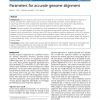Free Online Productivity Tools
i2Speak
i2Symbol
i2OCR
iTex2Img
iWeb2Print
iWeb2Shot
i2Type
iPdf2Split
iPdf2Merge
i2Bopomofo
i2Arabic
i2Style
i2Image
i2PDF
iLatex2Rtf
Sci2ools
131
click to vote
BMCBI
2010
2010
Parameters for accurate genome alignment
Background: Genome sequence alignments form the basis of much research. Genome alignment depends on various mundane but critical choices, such as how to mask repeats and which score parameters to use. Surprisingly, there has been no large-scale assessment of these choices using real genomic data. Moreover, rigorous procedures to control the rate of spurious alignment have not been employed. Results: We have assessed 495 combinations of score parameters for alignment of animal, plant, and fungal genomes. As our gold-standard of accuracy, we used genome alignments implied by multiple alignments of proteins and of structural RNAs. We found the HOXD scoring schemes underlying alignments in the UCSC genome database to be far from optimal, and suggest better parameters. Higher values of the X-drop parameter are not always better. E-values accurately indicate the rate of spurious alignment, but only if tandem repeats are masked in a non-standard way. Finally, we show that g-centroid (probabi...
Related Content
| Added | 08 Dec 2010 |
| Updated | 08 Dec 2010 |
| Type | Journal |
| Year | 2010 |
| Where | BMCBI |
| Authors | Martin C. Frith, Michiaki Hamada, Paul Horton |
Comments (0)

